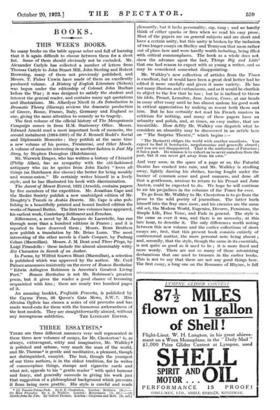BOOKS.
THIS WEEK'S BOOKS.
So many books on the table appear sober and full of learning that it is again difficult to choose between them for a short list. Some of them should obviously not be excluded. Mr. Alexander Carlyle has collected a number of letters from Thomas Carlyle to John Stuart Mill, John Sterling and Robert Browning, many of them not previously published, and Messrs. T. Fisher Unwin have made of them an excellently produced volume. A History of English Literature (Nelson) was begun under the editorship of Colonel John Buchan before the War ; it was designed to satisfy the student and interest the general reader, and contains many apt quotations and illustrations. Mr. Allardyce Nicoll in An Introduction to Dramatic Theory (Harrap) reviews the dramatic production of Greece, Rome, France, Italy, Germany and England as one, giving the same attention to comedy as to tragedy.
The first volume of the official history of The Mesopotamia Campaign comes in from K.M. Stationery Office. Messrs. Edward Arnold send a most important book of memoirs, the second instalment (1894-1901) of Sir J. Rennell Rodd's Social and Diplomatic Memories ; they publish at the same time a new volume of his poems, Trentaremi, and Other Moods. A volume of memoirs interesting in another fashion is Just My Story, by Stephen Donoghue (Hutchinson).
Mr. Warwick Draper, who has written a history of Chiswick (Philip Allan), has no sympathy with the old-fashioned antiquary who (as he quotes from John Earle) " loves all things (as Dutchmen doe cheese) the better for being mouldy and worme-eaten." He certainly writes himself in a lively style, and he has illustrated his book with discrimination.
The Ascent of Mount Everest, 1922 (Arnold), contains papers by five members of the expedition. Mr. Jonathan Cape and the Medici Society publish a new unabridged edition of Mr. Doughty's Travels in Arabia Deserta. Mr. Cape is also pub- lishing in a beautifully printed and bound limited edition the works of Samuel Butler. The first two volumes have appeared, his earliest work, Canterbury Settlement and Erewhon.
Silbermann, a novel by M. Jacques de Lacretelle, has run through more than a hundred editions in France ; and it is reported to have deserved them ; Messrs. Benn Brothers now publish a translation by Mr. Brian Lunn. The most interesting of the other novels is Castle Conquer, by Padraig Colum (Macmillan). Messrs. J. M. Dent send Three Plays, by Luigi Pirandello : these include the almost abominably witty Six Characters in Search of an Author.
In Poems, by Wilfrid Seawen Blunt (Macmillan), a selection is published which was approved by the author. Mr. Cecil Palmer announces insistently on the cover of Roman Barthalow " Edwin Arlington Robinson is America's Greatest Living Poet." Roman Barthalow is not Mr. Robinson's greatest poem, but it gives the reader a good chance of becoming acquainted with him ; there are nearly two hundred pages of it.
An amusing booklet, Profitable Proverbs, is published by the Cayme Press, 88 Queen's Gate Mews, S.W. 7. Miss Alexina Ogilvie has chosen a series of old proverbs and has made wood-cuts for them with the humorous awkwardness of the best models. They are straightforwardly absurd, without










































 Previous page
Previous page